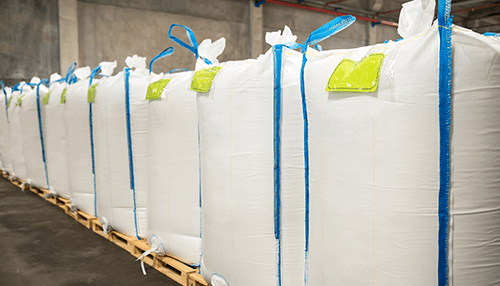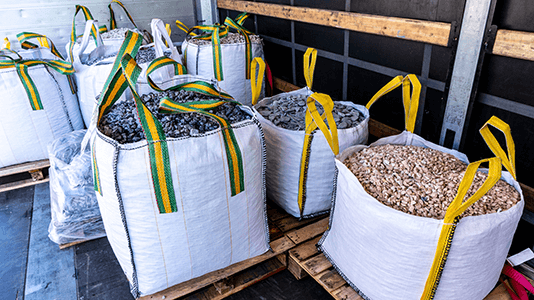Whether transporting bulk or granular items, a flexible intermediate bulk container (FIBC) is a highly viable storage solution. Known for its many names such as bulk bags, jumbo bags, or super sacks, these industrial containers are made from flexible woven materials that can store paper, sand, fertilizer, and petroleum products, among others. Not only are they able to hold multiple types of items, but they also make transporting them secure and cost-effective.
What Is A Flexible Intermediate Bulk Container?
An FIBC is a flexible and sturdy container that’s made from a type of thick plastic called polypropylene woven together. Bulk bags can either be coated or uncoated. A coated FIBC has an added layer of polypropylene that’s laminated to the woven fabric to minimize moisture seepage and to prevent the stored product from spilling. Inversely, an uncoated FIBC doesn’t have this reinforcement as an added feature.
Weighing no more than seven pounds or 3.2 kilos, a large FIBC is capable of carrying and transporting about one metric ton of cargo. Bulk bags are space-saving as you can stock one onto the other or fold flat when they’re empty.
What Are The Best Uses For FIBC?
Jumbo bags can store heavy loads and transport these items safely. There are special types of FIBC designed for specific products. Often, bulk bag discharge types and lift loops give a clue as to which products fit in which bulk bag.
Businesses often use them for the following bulk items:
-
- Powdery products: A polyethylene liner placed on a bulk bag’s interior section helps ensure that even fine powders can be transported in bulk.
- Food grade products: Any type of food item can be stored in a bulk bag. To ensure safety and freshness, it’s best to purchase a lining and place it inside the bag, too.
- Agricultural products: Granular products such as agricultural fertilizers and dry animal food can keep and carry these items in bulk without any problems.
-
- Pharmaceutical products: As with food items, FIBC can provide safe bulk storage and transportation for pharmaceutical products.
- Construction materials: The construction sector needs gravel, sand, and cement in high volumes. Jumbo bags can address this challenge by allowing for easy packaging.
- Wood and paper products: Processed wood and paper can be placed in FIBC bags for hassle-free transportation.
- Plastic products: Plastics are one of the most useful industrial raw materials. They’re often utilized as pellets and placed in bulk bags to be shipped out.
- Chemical products: Dry chemicals or those in granular and powdered forms can be transported safely in FIBC. These bags will remain sturdy and won’t burst at the seams.
- Petroleum products: Transporting potentially hazardous compounds aren’t a problem with specialized jumbo bags. These containers prevent electrostatic charges that cause explosions when transporting flammable items.
Almost any industrial product can be packed and stored inside jumbo bags, making them immensely useful warehousing facilities and logistics tools. They come in different shapes and structures, and finding the one that fits your business can be quite tricky.
Choosing the Right Bulk Bag
There are several things to consider before choosing the right FIBC for your product. Finding out the different types of bulk bags is the first step. Here are some of them:
- Type A Bulk Bags
This is a standard FIBC bag made from polypropylene, calcium carbonate, and other non-conductive fabric materials. Type A bags also have additives to protect the product against damage if they’re stored under unfavorable conditions.
Because they don’t offer static protection, products can generate static electricity when they’re moved vigorously or rubbed against the surface of the bag. This could lead to a spark or an explosion in highly ignitable environments. As such, these types of bags can’t be used to store and transport flammable products or in areas with combustible settings.
Great for: Transporting non-flammable items and in a safe area without combustible products nearby.
- Type B Bulk Bags
There’s not much difference between Type A and Type B bags. The latter is also made from standard plastic woven materials but has an add-on material that helps prevent sparks. A static-minimizing coating in Type B bags helps prevent the likelihood of an explosion.
Great for: Shipping flammable, powdered materials, but there shouldn’t be any flammable products nearby.
- Type C Bulk Bags
Also called conductor bags, this type must be grounded before use. This means the sack has to be connected electrically to the ground while being filled or discharged. These specialized containers are made from interwoven polypropylene fabric and conducting threads sewn together.
Great for: Transporting flammable powders or when flammable products are present. They shouldn’t be used when the ground connection has become damaged, though.
- Type D Bulk Bags
These anti-static bulk bags are made from a woven fabric that helps avoid static electricity or sparks because this type is made from completely static-dissipating fabric. Type D bags don’t require grounding as Type C bags.
Great for: Handling flammable products and items in combustible settings.
Bulk Bag Loops And Filling Options
Apart from the presence and absence of static protection, FIBC bags also have different loop designs to make handling, lifting, and discharging easier.
- Corner seam loops: These are the most common loop type where each corner has a lift loop. They may be harder to lift when using forklifts because all four loops need to be used.
- Cross corner loops: These bags also have loops in every corner of the bag but instead of being sewn in the corners, the loops are sewn into the bag’s eight corners.
- Stevedore straps: Single, double, and supporting loops are non-traditional handles made for bags that need to be lifted by machines.
- Sleeve loops: These bags are special types of FIBC made exclusively for forklifts. The downside is it can’t be used without a forklift.
There are many bulk bag unloader options available based on your application and requirements and can be chosen based on how you’re filling them. Some bulk bags can be made narrower if you’re filling them with machines while some can have a wider and open-top if you plan on filling them using a shovel.
Final Thoughts
FIBC are highly versatile bags that carry any type of product and for a variety of industrial applications. Bulk bags allow for bulk transportation, making them a cost-effective, time-reducing, and space-saving storage and shipping option for most businesses.



